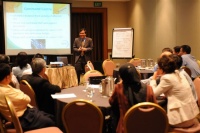Crisis Management Courses


CM-200 Crisis Management Planner

Crisis Management Planner or CM-200 is a 1-day crisis management (CM) course with a 50-Multiple Choice Question (MCQ) based examination following the successful completion of the course. A crisis is a critical event that may impact an organization's profitability, reputation, or ability to operate. CM-200 is available via a one-day (introductory-level) Crisis Management course for participants to guide professional who are appointed with the responsibilities to manage crisis, disaster and an events. The course is an experiential facilitated workshop led by an experienced instructor. It is important to note that CM-200 is a fundamental course in crisis management and the content emphasized on the principles of crisis management. This course is suitable for organisations and agencies who would like to have an overview of what is crisis management. The participants will benefit from the introduction to crisis management and also the relationship between its Business Continuity Management (BCM) and Disaster Recovery (DR) implementation effort. Participants will learn the basic of a crisis management program and the tool/ techniques to help to develop specific crisis management plans. This course has been recommended by past participants to be a practical course that will take the participants through the proper implementation of a crisis management plan.
CM-300 Crisis Management Implementer

Crisis Management Implementer or CM-300 is a 2-day intermediate course with an two and half hour 100 Multiple Choice Question (MCQ) based examination, following the successful completion of the course. This intermediate-level course is suitable for organisations and agencies embarking on its crisis management journey after the completion of its Business Continuity Management (BCM) and Disaster Recovery (DR) implementation effort. Some participants will use this to evaluate the effectiveness and efficiency of their crisis management program. Others will use this as a tool to help to develop specific crisis management plans. Using a case study and experience sharing by the facilitator, this course has been recommended by past participants to be a practical course that will take the participants through the proper implementation of a crisis management plan.
This course will enable participants to:
- Assemble the crisis management team members.
- Assess the risk and threats such as riots, supply chain disruptions and product recalls.
- Learn to track and trace incident events and prioritize decisions and activities.
- Link crisis communications within and outside of the organization.
- Have a clear view of the command and control within the command centres.
- Coordinate with external agencies and local authorities.
- Test and exercise the crisis management plan.
- Manage the crisis management together with other plans such as BC and DR.
CM-400 Crisis Management Manager

Crisis Management Manager or CM-400 is a 2-day advanced level Crisis Management (CM) course with an additional of 3 and 1/2 hour 150-Multiple Choice Question (MCQ) based examination, following the successful completion of the course. It is primarily designed and developed to instill detailed concepts and knowledge in CM/BCM practitioners, which will enable the individual to drive CM programmes and projects for the entire organisation. This course is structured to develop and train Organization BCM Coordinator, CM/BC mangers, planners, and project managers.
This course will enable participants to:
- Identify possible threats that may disrupt the organisation.
- Strengthen organisational resiliency to counter major incidents and disaster.
- Develop crisis management strategies.
- Develop and implement comprehensive CM plans.
- Create and develop CM awareness and training programme.
- Conduct exercises and tests.
- Implement CM audit and assessment programmes to ensure CM plan effectiveness.
- Drive organisation-wide CM program.
CM-5000 Crisis Management Expert Implementer

Crisis Management Expert Implementer or CM-5000 is an advanced level Crisis Management (CM) course with a 150-Multiple Choice Question (MCQ) based examination, following the successful completion of the course. The course content is a combination of CM-300 Crisis Management Implementer (Day 1 to 2) with CN-400 Crisis Management Manager (Day 3 and 4).
Non-certification Course
CC-2010: Crisis Communications and Management for Senior Management
CC-2010 Crisis Communications and Management for Senior Management is a one day course for Executive Management to equip them with practical tactics to better manage “real” crisis and disasters under extremely stressful situations. This is a hands-on course that will walk the participant through the situation using a case study.
CM-2020: Emergency Response and Management during an Incident

BCM-2020 is a one day course to equip participants with effective responses during a crisis which will help the organisation to ensure life safety, and minimize the impact on information and infrastructure assets. It will ensure that the organisation has the resources to recover and resume critical business operations effectively and impart to participants the knowledge pertaining to incident and escalation management, emergency response, damage assessment and plan activation.
CM-2030: Effective Management of Public Relations and Coordination with External Agencies
BCM-2030 is a one day course to equip participants with a good Public Relation (PR) approach in a disaster situation. A sound crisis communications plan will help the Crisis Management Team (CMT) better manage relations with public and external parties, such as regulators and legislators, government agencies, and Non-Government Organisations (NGOs). This course is designed to ensure participants understand the types of audiences and messages that must be addressed and communicated in the event of a crisis.

CM–2040: Incident Command System (ICS)

BCM-2040 is a one day course for BC managers and coordinators to understand the Incident Command Systems (ICS) structure, and to learn how to coordinate with public agencies. At the same time, the structure provides a framework for the organization to manage incidents affecting it.
CM-2050: Practical Tools for Conducting the Disaster Simulation Exercise
BCM-2050 is a one day course for participants to assist their organizations and agencies to move into a mature stage of BCM by looking into disaster scenario planning. Some will use this to evaluate the effectiveness and efficiency of their BC plans and BCM programme. Others may use this as a tool to help develop specific BC and emergency response plans. This practical course will take participants through the disaster life cycle with the use of a case study. The scenario for these exercises can be tailored from a typical threat of bombing or fire incidents to an infectious disease Ebola or H1N1 Influenza A Pandemic outbreak.